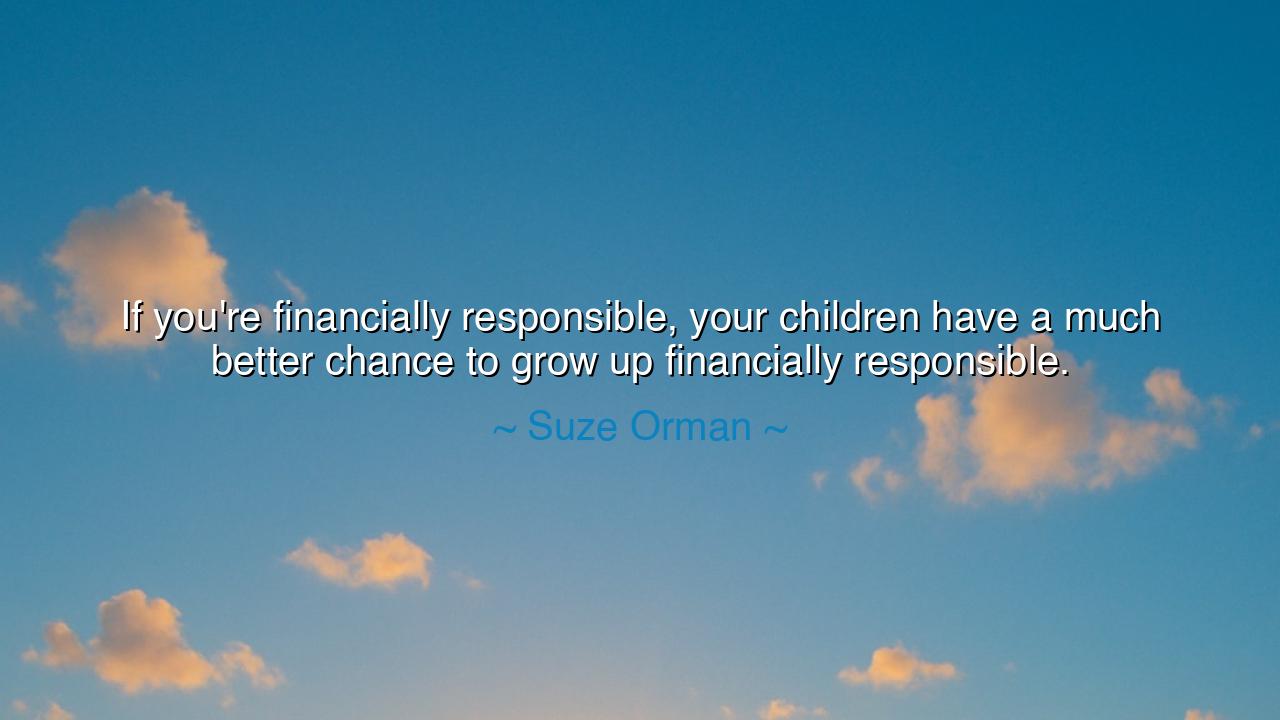
If you're financially responsible, your children have a much
If you're financially responsible, your children have a much better chance to grow up financially responsible.






In the words of Suze Orman: “If you’re financially responsible, your children have a much better chance to grow up financially responsible.” Though it seems at first to speak only of money, it is in truth a saying about the transmission of wisdom, the shaping of character, and the inheritance that reaches far deeper than gold. For wealth itself may vanish in a single storm, but the habits of prudence, discipline, and foresight—these endure, passing from parent to child like an unbreakable chain across the centuries.
The ancients well understood this truth. They taught that the greatest inheritance was not jewels or lands, but virtue and knowledge. To be financially responsible is not merely to guard one’s purse, but to master desire, to choose patience over haste, and to live with balance rather than excess. And when children watch their parents live in this way—saving rather than squandering, planning rather than drifting—they absorb lessons more powerful than any sermon. The household becomes the first school, and the parent the first teacher of wisdom.
Consider the story of Benjamin Franklin, one of the founding fathers of America. As a boy, he watched his father work steadily and modestly, instilling in him the values of thrift and diligence. Franklin grew to embody those lessons, writing in his Poor Richard’s Almanack that “a penny saved is a penny earned.” His example shows us that the training of the young lies not in lectures alone, but in the living example of those who raise them. Just as Franklin’s father’s steady habits bore fruit in his son’s brilliance, so too can a parent’s care with money plant seeds of responsibility in future generations.
Orman’s words also carry a warning. For if a parent is careless with money—living beyond their means, drowning in debts of their own making—the child will learn not prudence, but folly. The ruin of households, the breaking of families, often comes not from storms or wars, but from a lack of foresight, from the squandering of today without thought for tomorrow. The scrolls of history are filled with dynasties that collapsed not from external foes, but from the greed and excess of their rulers. To be financially responsible is not a private matter; it is the shield that guards one’s children and the foundation that sustains their future.
Yet let us not mistake responsibility for hoarding. True responsibility is not miserly withholding, but wise stewardship. It means saving for need, giving with generosity, and teaching children the balance of both. A parent who shows restraint in spending, care in planning, and joy in generosity leaves their children not only prepared for prosperity, but also for kindness. For money is but a tool; the heart that wields it wisely creates stability and blessings that ripple outward through time.
The lesson, then, is clear: live as an example, for your children learn more from what you do than from what you say. Teach them the value of work, the dignity of saving, the wisdom of restraint, and the joy of giving. Show them that wealth is not measured by what one spends, but by what one preserves, protects, and shares. If you are financially responsible, you give them not only security but a compass for their own lives.
Practical actions stand before you: keep a household budget, so your children see order in your affairs. Save consistently, even in small amounts, so they witness patience. Speak openly about money, not as a taboo, but as a subject of wisdom. Involve your children in small decisions, teaching them to weigh costs and consequences. And above all, let them see that money is a servant, never a master.
Thus, Orman’s words resound like the teachings of the ancients: to raise wise children, be wise yourself. To shape the future, discipline your present. And to ensure the prosperity of generations yet unborn, live each day with the noble art of financial responsibility. For in this art lies not only stability of wealth, but the endurance of character, which no thief nor fire can destroy.






AAdministratorAdministrator
Welcome, honored guests. Please leave a comment, we will respond soon